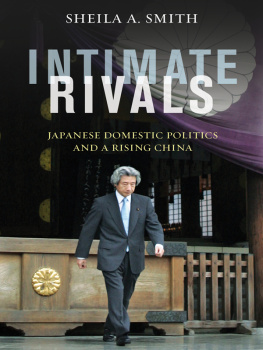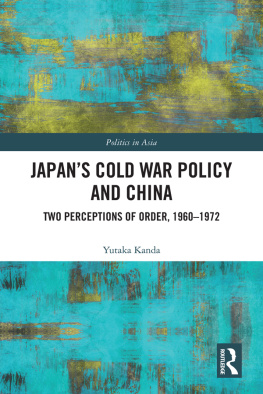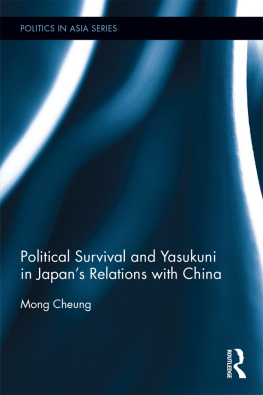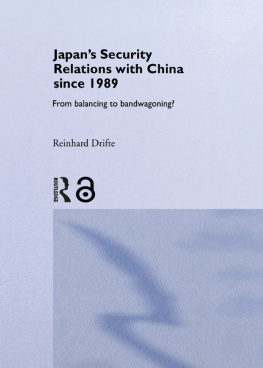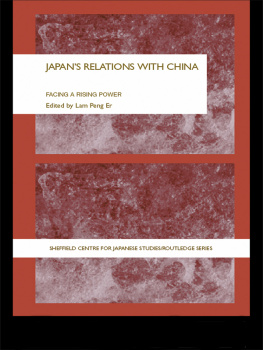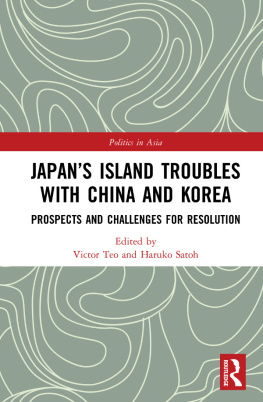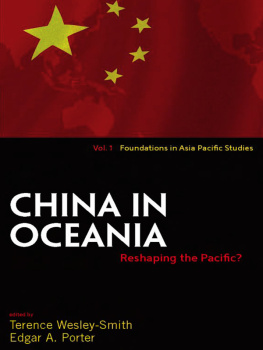INTIMATE
RIVALS
The Council on Foreign Relations (CFR) is an independent, nonpartisan membership organization, think tank, and publisher dedicated to being a resource for its members, government officials, business executives, journalists, educators and students, civic and religious leaders, and other interested citizens in order to help them better understand the world and the foreign policy choices facing the United States and other countries. Founded in 1921, CFR carries out its mission by maintaining a diverse membership, with special programs to promote interest and develop expertise in the next generation of foreign policy leaders; convening meetings at its headquarters in New York and in Washington, DC, and other cities where senior government officials, members of Congress, global leaders, and prominent thinkers come together with CFR members to discuss and debate major international issues; supporting a Studies Program that fosters independent research, enabling CFR scholars to produce articles, reports, and books and hold roundtables that analyze foreign policy issues and make concrete policy recommendations; publishing Foreign Affairs, the preeminent journal on international affairs and U.S. foreign policy; sponsoring Independent Task Forces that produce reports with both findings and policy prescriptions on the most important foreign policy topics; and providing up-to-date information and analysis about world events and American foreign policy on its website, www.cfr.org.
The Council on Foreign Relations takes no institutional positions on policy issues and has no affiliation with the U.S. government. All views expressed in its publications and on its website are the sole responsibility of the author or authors.
INTIMATE
RIVALS
Japanese Domestic Politics and a Rising China
Sheila A. Smith
A Council on Foreign Relations Book
Columbia University Press New York
Columbia University Press
Publishers Since 1893
New York Chichester, West Sussex
cup.columbia.edu
Copyright 2015 Columbia University Press
All rights reserved
E-ISBN 978-0-231-53802-2
Library of Congress Cataloging-in-Publication Data
Smith, Sheila A., 1959
Intimate rivals : Japanese domestic politics and a rising China / Sheila A. Smith.
pages cm
A Council on Foreign Relations Book.
Includes bibliographical references and index.
ISBN 978-0-231-16788-8 (cloth : alk. paper)
ISBN 978-0-231-53802-2 (e-book)
1. JapanForeign relationsChina. 2. ChinaForeign relationsJapan. 3. JapanPolitics and government21st century. I. Title.
DS849.C6S64 2014
327.52051dc23 2014022523
A Columbia University Press E-book.
CUP would be pleased to hear about your reading experience with this e-book at .
COVER IMAGE: Prime Minister Koizumi Junichir pays homage to the imperial war dead at Yasukuni Shrine, October 17, 2005.
(REUTERS/Eriko Sugita)
COVER DESIGN: Noah Arlow
References to Web sites (URLs) were accurate at the time of writing. Neither the author nor Columbia University Press is responsible for URLs that may have expired or changed since the manuscript was prepared.
For Ian Hendry Smith
CONTENTS
I began to consider the idea of writing a book on Japans relations with China in the early 2000s while at the East-West Center in Hawaii. Tensions between Japan and China had erupted over the visits by Prime Minister Koizumi Junichir to the controversial war memorial, Yasukuni Shrine, and policymakers in Washington were becoming increasingly concerned about the inability of Tokyo and Beijing to put their history behind them. An East-West Center alumnus, Otsuka Takao, president of the Hotel Grand Palace in Kudanshita, offered me the perfect setting for my frequent research trips to Tokyo with my boisterous young son. The hotel was located next to the Yasukuni Shrine, and we often walked among the beautiful gingko trees and towering torii gates in the early hours of the morning when jetlag made sleep impossible. Aged Shinto priests rustled in their robes from building to building, and I could not help but wonder how this rather anachronistic site had become a focal point in the diplomacy of Asias two largest nations.
Differences over twentieth-century history were not the only cause of Sino-Japanese tensions. At the beginning of the twenty-first century, new difficulties arose. Trade tensions over the import of shiitake mushrooms and tatami mats began to complicate economic relations. Violence against Japanese at the Asian Cup games in Beijing in 2004 shocked many in Japan. When demonstrators in cities around China protested the revision of Japanese textbooks in March 2005, Japanese businesses also were damaged, further souring public opinion about China. In the corridors of Asian summit meetings, Chinese and Japanese leaders exchanged chilly stares and refused to speak. In 2006, in the midst of this deep freeze in diplomatic relations, Prime Minister Koizumi, dressed in full formal wear, paid an official visit to the Yasukuni Shrine on August 15, the day of the Japanese commemoration of the end of the war. A few weeks later, he resigned after five years as Japans prime minister.
For a while, Koizumi was blamed for the downturn in Tokyos relations with Beijing, and his successors seemed to make progress in changing the tenor of the relationship. Other factors continued to plague diplomatic ties, however. Public attitudes toward China were hardening. Chinas economy grew, and the economic interdependence that had anchored Japans relationship with China created unforeseen frictions. The new UN Convention on the Law of the Sea raised questions about maritime claims, and the East China Sea became more and more populated with survey ships and new, more modern, naval vessels. Even regarding the deeply sensitive issue of historical memory, the Koizumi era was not the first entanglement of China policy with Japanese domestic politics and popular sentiment, and it would not be the last. In Japan, this intimate contact with a changing China was unnerving to many and called into question the premises of Japans postwar identity.
The Sino-Japanese relationship seemed impervious to the efforts of political leaders and government bureaucrats to find common ground. In the fall of 2006, Koizumis successor, Abe Shinz, traveled to Beijing to begin a process of reconciliation and to craft a new, mutually beneficial relationship for China and Japan. Two years later, after a reciprocal visit by the popular Chinese premier, Wen Jiabao, to Japan, President Hu Jintao met in Tokyo with Prime Minister Fukuda Yasuo. The May 2008 Hu-Fukuda summit laid out an ambitious agenda of cooperation, including joint energy development in the East China Sea and a food safety agreement. But the diplomatic accomplishment was short-lived. The East China Sea agreement was never implemented, and the food-poisoning case involving imported frozen Chinese dumplings took another two years to resolve. To make matters worse, a relatively small incident in September 2010 involving a Chinese fishing trawler and two Japan Coast Guard vessels blossomed into the biggest postwar crisis in Sino-Japanese relations and opened a rift between Beijing and Tokyo that continues today. Equally important, the flare-up of tensions over the sovereignty of the Senkaku Islands (known as the Diaoyu Islands in China) provoked a domestic debate over Japans ability to manage a rising China.
The last forty years of Japanese-Chinese diplomatic relations have rested on a simple premise: economic interdependence would be the path to postwar reconciliation between the peoples of both countries. At first glance, this reliance on close economic ties seemed to be a successful strategy for overcoming political strains, and it ensured an opportunity for greater prosperity for Japanese and Chinese alike. Moreover, there was plenty of evidence of good feelings between the people of Japan and China. The Japanese response to the Sichuan earthquake and the Chinese willingness to allow that aid to be delivered spoke to the progress achieved by Fukuda and Hu in their Tokyo meeting just days before. Several years later, Beijing returned the kindness by delivering aid to Japanese in Tohoku after the Great East Japan Earthquake. Japanese investment in China continued to grow, and Chinese goods, services, and now investment flowed into the Japanese economy, signaling a new era of mutual prosperity. In 2009, a new reformist political party with a desire for even closer relations with China and a commitment to historical reconciliation came into power in Tokyo.

